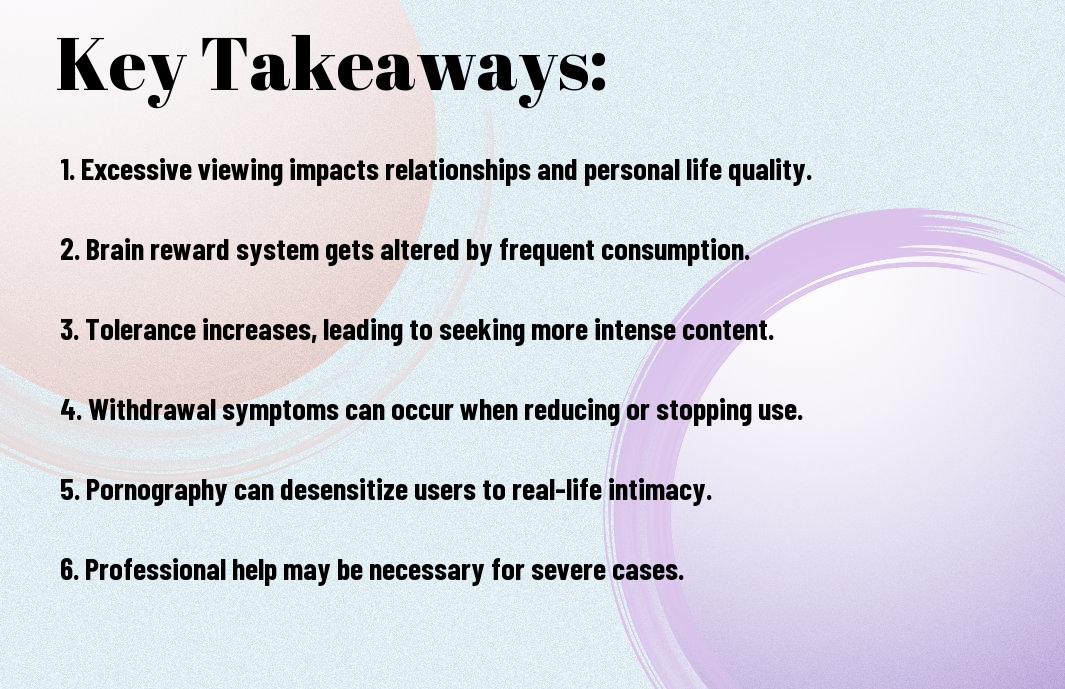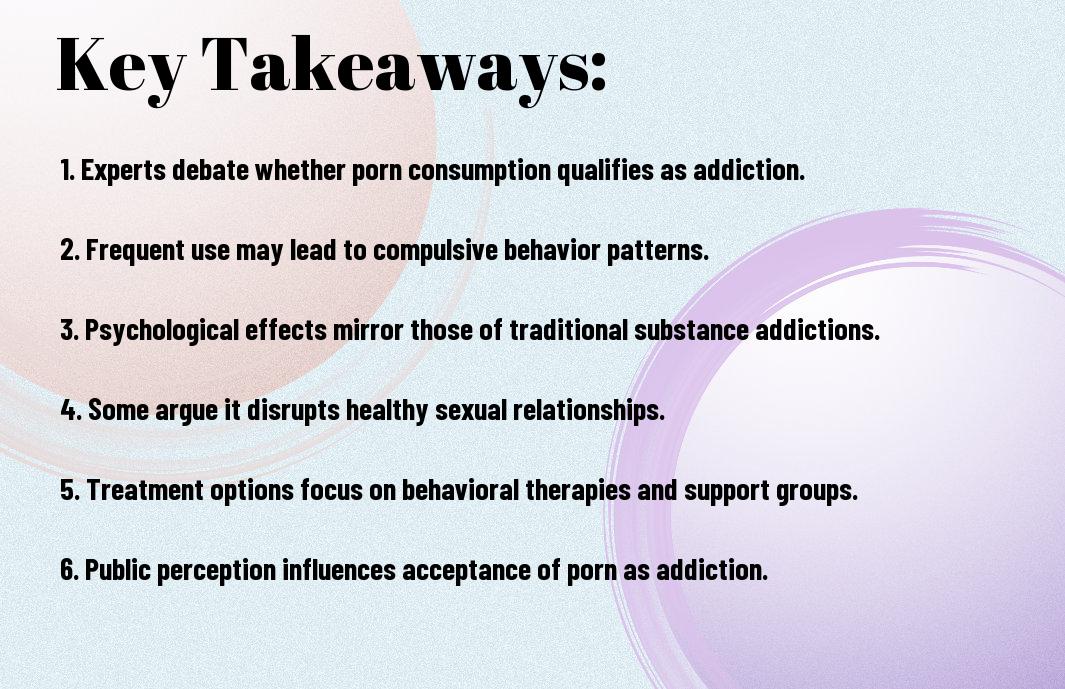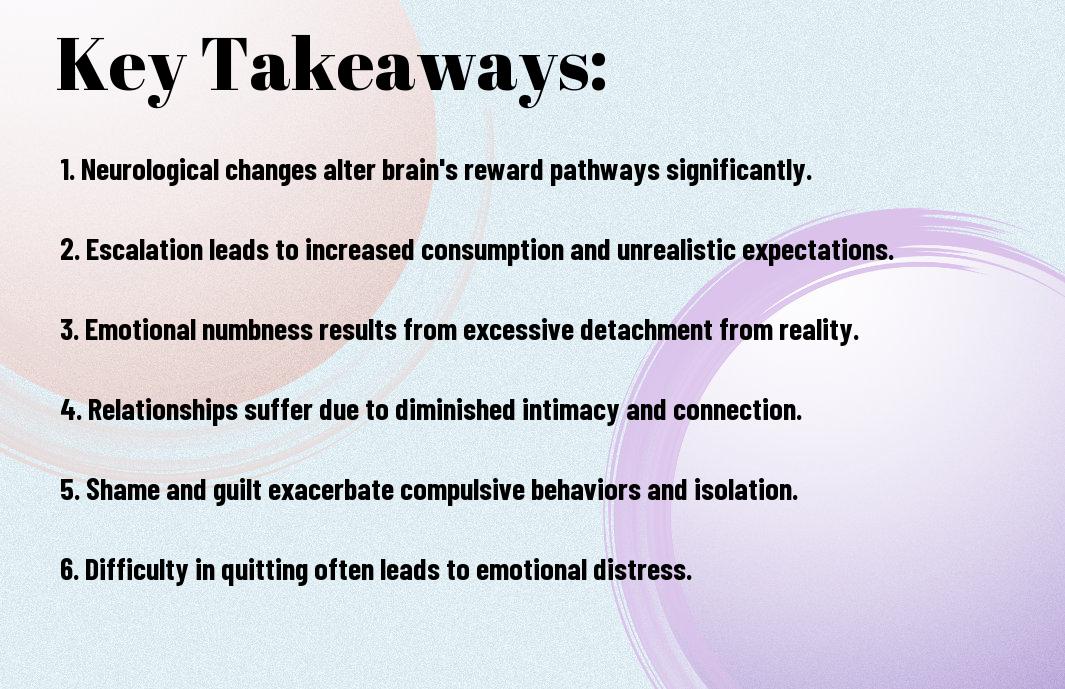There’s a growing concern about the impact of pornography on mental health and relationships. As you navigate through your daily life, you may question whether your porn consumption is simply a habit or if it has crossed the line into addiction. In this post, you will uncover seven shocking facts that reveal the true nature of porn addiction and its potential effects on your well-being. Understanding these facts can help you evaluate your relationship with porn and make informed decisions moving forward.
Key Takeaways:
- Understanding porn addiction involves recognizing the signs, such as loss of control, increased tolerance, and withdrawal symptoms.
- Research indicates that frequent porn consumption can alter brain chemistry, leading to decreased satisfaction in real-life relationships.
- A significant percentage of individuals report negative impacts on their sexual performance and intimacy due to excessive porn use.
- Many people mistake casual use for addiction, but factors such as time spent and emotional reliance are key indicators.
- Seeking help through therapy and support groups can be effective strategies for those struggling with porn addiction.
Understanding Pornography Addiction
A growing number of individuals are recognizing the impact of pornography on their lives. Understanding pornography addiction is imperative, as it can significantly affect your relationships, mental health, and overall well-being. Like any addiction, it often involves a compulsive behavior that takes precedence over other imperative aspects of your life, potentially leading to negative consequences.
Definition of Porn Addiction
Any recurring pattern of excessive pornography use that disrupts your daily functioning and emotional health can be considered porn addiction. It goes beyond mere enjoyment, becoming a compulsion that you find difficult to control, resulting in feelings of guilt or shame. You may start prioritizing porn over important life tasks or relationships, signaling a deeper problem.
Signs and Symptoms
Against the backdrop of your daily life, signs of porn addiction may include an escalating need for more extreme content, neglecting responsibilities, or using porn as an escape. You might find that you increasingly prefer pornography over real intimate relationships or lose interest in sexual activities with partners. Identifying these symptoms is the first step toward addressing potential addiction.
But recognizing these signs is vital for your self-awareness and growth. Other indications include spending excessive time viewing porn, using it to cope with stress or anxiety, and experiencing relationship issues related to your habits. If you’ve noticed these symptoms in yourself, it may be helpful to explore underlying issues and seek support for developing healthier habits around intimacy and sexuality.
The Prevalence of Porn Addiction
Clearly, porn addiction is more common than you might think. Many individuals face difficulties in managing their consumption of pornographic material, which can lead to negative impacts on relationships, self-esteem, and daily functioning. As society becomes more accepting of explicit content, the lines between regular viewing habits and addiction may blur, creating challenges in understanding your own consumption and its effects.
Statistics and Research Findings
To understand the scope of porn addiction, various studies have indicated that a significant number of individuals display compulsive behaviors towards porn consumption. Reports suggest that around 10% to 30% of adults might experience problematic pornography use, indicating that this is an alarming issue affecting a large segment of the population.
Demographic Insights
At the same time, understanding who is most affected by porn addiction can shed light on the issue. Research shows that while both men and women can struggle with pornography, males typically report higher rates of compulsive use. Additionally, younger demographics, particularly teenagers and young adults, are increasingly exposed to porn, which raises concerns about the long-term impacts on sexual health and relationships.
The prevalence of porn addiction varies across different age groups and genders. Studies indicate that younger people, especially those in their teens and twenties, are more likely to engage in excessive consumption. Interestingly, men often report higher levels of addiction compared to women. However, anecdotal evidence suggests rising instances among women as societal norms evolve. Recognizing these trends can help you understand if you or someone you know might be affected and guide you toward seeking help or resources.

Psychological Impact of Porn Addiction
To understand the psychological impact of porn addiction, it is necessary to recognize how it affects your brain and behavior. Regular consumption can lead to desensitization, altering your perceptions of intimacy and attraction. Over time, you may find that the fantasy world of pornography interferes with your ability to form genuine connections, leading to emotional distress, reduced self-esteem, and increased anxiety.
Effects on Mental Health
By indulging in excessive porn use, you may experience a range of mental health issues, including depression and low self-worth. The dopamine spikes from viewing pornography can lead to an unhealthy cycle of seeking more pleasure, which might leave you feeling empty and unfulfilled. This often creates a negative feedback loop where the more you rely on porn, the less satisfied you become in real-life scenarios.
Relationship Consequences
The effects of porn addiction extend into your relationships, making it challenging to connect authentically with your partner. You may find that your expectations for intimacy become skewed, prioritizing the unrealistic standards set by porn over the emotional and physical intimacy of a real relationship.
Also, porn addiction can create a significant rift between you and your partner, as it may lead to feelings of insecurity, betrayal, and mistrust. If your partner discovers your consumption habits, it can result in arguments, emotional withdrawal, or even the dissolution of the relationship. The detachment often felt in these situations underscores the importance of open communication, as neglecting the issue can exacerbate existing problems and cause long-term damage to your relationship.
Physical Effects of Excessive Porn Consumption
Many individuals underestimate the physical consequences of excessive porn consumption. Research indicates that prolonged exposure can alter your brain’s reward system, leading to issues such as reduced sensitivity to sexual stimuli. For insights into this topic, check out the 7 Major Myths About Pornography that debunk common misconceptions surrounding porn and its effects on your life.
Desensitization
Among the most alarming effects is desensitization. As you consume more porn, your brain may require increasingly extreme content to achieve the same level of arousal, which can dull your sexual responses in real-life situations.
Sexual Dysfunction
Against a backdrop of continuous exposure, many users report sexual dysfunction, including erectile issues and difficulties in maintaining arousal with a partner. This is often linked to the brain’s adaptation to overly stimulating content that does not translate to real-life intimacy.
And as your reliance on porn grows, your ability to connect with your partner on a sexual level may diminish. This disconnect can lead to anxiety about performance and intimacy, further exacerbating sexual dysfunction. It’s important to address these issues to foster healthier relationships and a balanced perspective on sex.

Comparing Porn Addiction to Other Addictions
Now, understanding how porn addiction stacks up against other types of addiction can provide clarity on its impact on your life. Here’s a breakdown of some key differences and similarities:
Comparison Table
| Aspect | Porn Addiction |
|---|---|
| Withdrawal Symptoms | Unrest, irritability |
| Brain Impact | Dopamine release and desensitization |
| Social Stigma | Higher than most substance abuses |
| Treatment Options | Therapy, support groups |
Similarities to Substance Abuse
Along with the psychological and emotional struggle, porn addiction shares several traits with substance abuse. Both can create a strong dependence that disrupts daily life, relationships, and overall health. You might find your brain responding similarly to the effects of addictive substances, resulting in compulsive behavior and difficulty in quitting.
Unique Aspects of Porn Addiction
Among the specific elements that distinguish porn addiction from other forms are the social implications and the nature of the addiction itself. You can access porn easily through various devices, making it integral to modern experience but not commonly discussed, leading to isolation and misunderstanding.
At the core of porn addiction lies the fact that its accessibility and anonymity can exacerbate feelings of shame and guilt. Unlike other addictions, where physical substances might require abstinence and treatment in a controlled environment, porn addiction often happens in the privacy of your own space. This can lead to an internal battle that’s less visible and more difficult to address and understand, compounded by societal stigma surrounding the topic. You might find it challenging to seek help, making it vital to recognize its unique characteristics in both personal impact and treatment approaches.

Treatment and Recovery Options
All individuals struggling with porn addiction can find various treatment and recovery options tailored to their needs. These approaches combine professional help, support from peers, and personal strategies to foster healthier relationships with sexuality. Implementing these options can lead to substantial improvements in your overall well-being and quality of life.
Therapeutic Approaches
Options such as cognitive-behavioral therapy (CBT) and mindfulness practices are effective therapeutic methods for addressing porn addiction. These approaches help you understand the underlying causes of your addiction, develop coping strategies, and change harmful thought patterns. Working with a qualified therapist can provide you with the tools you need for sustainable recovery.
Support Groups and Resources
Between professional therapy sessions, engaging with support groups can reinforce your recovery journey. These communities provide a safe environment to share experiences, gain insights, and receive encouragement from others who understand the challenges you face. Support groups can hold you accountable while fostering a sense of belonging and compassion.
Further, various online platforms and local organizations offer resources, including forums, workshops, and educational materials related to porn addiction. Utilizing these tools can enhance your recovery process, connecting you with others in similar situations while providing valuable information to navigate obstacles. By reaching out for support, you empower yourself on this path toward healing and transformation.

Conclusion
Hence, understanding how much porn constitutes an addiction is crucial for recognizing its impact on your life. The shocking facts highlight the potential repercussions on relationships, mental health, and productivity. By remaining informed about your consumption habits, you can evaluate whether it’s time for a change. Awareness is the first step toward making healthier choices, and it empowers you to seek help if you find yourself relying on porn more than you’d like. Your well-being matters, and gaining insight into this issue can lead to a healthier, more balanced lifestyle.
FAQ
Q: What is considered a porn addiction?
A: Porn addiction can be characterized by an excessive preoccupation with pornographic material that disrupts daily life, relationships, and responsibilities. Individuals may find it hard to control their consumption, even when it leads to negative consequences.
Q: How does porn addiction differ from casual viewing?
A: Casual viewing of porn can be a normal activity for many; however, addiction is marked by compulsive behavior where the individual feels compelled to watch porn, often prioritizing it over other important activities or relationships. This compulsive behavior can lead to feelings of shame or distress.
Q: What are some signs that someone is struggling with porn addiction?
A: Signs may include spending excessive amounts of time viewing porn, neglecting personal or professional responsibilities, experiencing relationship problems, or using porn as a coping mechanism for stress or anxiety. An individual may also try to cut back but finds it difficult to do so.
Q: Can porn addiction have physical effects on the brain?
A: Yes, studies suggest that excessive consumption of porn can alter the brain’s reward system, similar to the effects of substance addiction. It can lead to desensitization, where individuals may require increasingly extreme content to achieve the same level of arousal, impacting dopamine levels and overall satisfaction.
Q: Are there any long-term consequences associated with porn addiction?
A: Long-term consequences may include impaired sexual function, desensitization to sexual stimuli, difficulties with intimate relationships, and in some cases, mental health issues such as anxiety or depression. An individual may find real-life intimacy less satisfying compared to the fantasies created through porn.
Q: What can individuals do to address porn addiction?
A: There are several strategies to tackle porn addiction, including setting limits on usage, seeking therapy or counseling, joining support groups, and finding healthier ways to cope with stress or emotional upheaval. Mindfulness and self-reflection may also be effective in understanding triggers and managing impulses.
Q: Is it possible to recover from porn addiction?
A: Yes, recovery is possible with commitment and support. Many individuals have successfully reduced their consumption of pornography or eliminated it from their lives altogether. With appropriate resources, including therapy and a supportive network, recovery can lead to improved mental health and better relationships.










